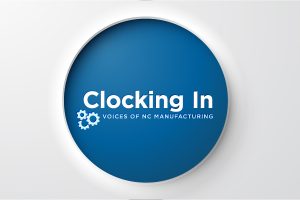Creating Quality and Engineering Excellence in Manufacturing
Women are driving quality and engineering excellence in the manufacturing industry, reshaping the landscape of this traditionally male-dominated field. With a blend of meticulous attention to detail, innovative problem-solving skills and a commitment to excellence, women are making significant strides in quality assurance and engineering roles. As the industry evolves, their contributions are not only breaking gender barriers but also setting new standards for efficiency and precision.
In the second of three parts in the Women in Manufacturing series, we spotlight three women highlighting their pivotal roles in ensuring top-notch quality and driving engineering advancements.
Amanda Periman, Quality and Service Manager at ZIEHL-ABEGG

“Standing up for what you believe is right is crucial, particularly in quality control.”
– Amanda Periman
Amanda Periman pursued chemical engineering during her college years, drawn to subjects like math and chemistry. “During my time in school, I had an internship in a research and development lab, which was valuable, but the setting didn’t quite resonate. Sitting in a lab working on projects alone felt monotonous, the same routine day in and day out. I craved more activity and more teamwork. While searching for jobs, I found myself gravitating towards manufacturing. The industry’s dynamic nature, where every day presents new challenges and opportunities to collaborate with diverse teams, was incredibly appealing,” Periman shared. Since then, she has embraced the manufacturing world, finding fulfillment in its ever-changing landscape and constant growth and innovation opportunities.
ZIEHL-ABEGG in Greensboro, NC, is known for making fans as quiet as “owl wings.” This distinction isn’t lost on Periman. “Every one of our fans goes through end-of-line testing. We have well-trained quality inspectors who ensure every fan that goes out the door passes our standards, testing and product specifications,” said Periman. As the quality and service manager, Periman ensures that ZIEHL-ABEGG USA products meet the quality standards of the company and the customer. She collaborates with the production and sales teams to meet those goals. On the service side, if a customer issue arises, she works closely with the customer to ensure concerns are addressed quickly and efficiently.
“When I started at ZIEHL-ABEGG, our team was relatively small, with less than 10 people. Now, we’ve expanded to about 22 team members, which is quite a significant growth.” Periman continued, “It was a unique experience for me to come into this role and be entrusted with the responsibility of growing the team. This level of trust and autonomy was something I hadn’t experienced before, and it has been incredibly beneficial for both the company and myself. With our rapid growth, being given the ability to expand the team has been crucial for our operations and overall success.”
“When I began my career in the industry, our entire team at that R&D site was women, which was a refreshing and empowering environment. My manager had an impressive background in manufacturing, with nearly 30 years of experience and a master’s degree in business administration and a bachelor’s in chemistry. She had followed a similar path to mine, which made her a great mentor. She played a pivotal role in helping me advance into leadership positions. Her guidance has been instrumental in shaping my career path,” said Periman.
Emotional intelligence is often not the first thing someone thinks of when they hear the word “manufacturing” but Periman says that characteristic is something special women bring to manufacturing. “Women bring a unique perspective with their emotional intelligence, especially when working closely with employees. Instead of solely focusing on directives and orders, a deeper understanding and empathy can be beneficial in managing teams. In manufacturing, the typical approach can be more task-oriented and focused on results. Still, with women in leadership positions, there’s often a consideration for the human side of the equation. This can lead to a more holistic approach to problem-solving and decision-making, considering the impact on individuals within the organization,” stated Periman.
Navigating the manufacturing industry as a woman, especially a younger one, can present its challenges. Periman shares advice for other women in manufacturing, “Standing up for what you believe is right is crucial, particularly in quality control. There’s often pressure to release products or overlook issues, but it’s essential to prioritize customer satisfaction and safety. While challenging, maintaining confidence is key in facing these obstacles head-on.”
Kristyn Belcher, Quality Management Systems Supervisor at ZIEHL-ABEGG

“You can come into this field and make an impact, showing what you’re capable of and being recognized for it.”
– Kristyn Belcher
Investing in employee training is more than just a business strategy; it’s a commitment to the growth and success of both the individual and the organization. ZIEHL-ABEGG quality management systems supervisor Kristyn Belcher is the product of ZIEHL-ABEGG’s commitment to fostering employee growth. Starting in 2015, right out of high school, Belcher worked up to her current position.
She started working in the service department, working on the fans, traveling to customers and helping them make repairs. She shifted to the quality department, conducting inspections and handing down corrective actions before she began managing ISO 9001 activities and qualifying all of ZIEHL-ABEGG’s suppliers and the parts that come from them. “I entered this job right after graduating high school and initially, I was studying animal science to become a farm veterinarian. I needed a way to pay for college, but as I got deeper into this role, I saw a better career path for myself. I was fortunate to have a couple of mentors who played pivotal roles in my development.” Belcher continued, “One was well-versed in quality control and ISO standards, providing me with valuable insights into those areas. The other mentor was on the business side, serving as the director of our company. He comprehensively understood the company’s operations and was instrumental in guiding me. As long as I expressed a desire to grow, the company supported me, offering various training programs and opportunities for advancement.”
One of her female mentors, a former quality manager at ZIEHL-ABEGG, played a pivotal role in the early days of Belcher’s quality management training. “She had extensive experience with ISO 9001 and various quality standards, which was invaluable to me. She took me under her wing, guiding me on what training I needed and helping me understand the intricacies of a robust quality management system. Her expertise was evident in her knowledge of standards like ISO 9001 and 14001, and she taught me how to manage a quality management system effectively. We still keep in touch, and I am grateful for the mentorship and knowledge she shared with me,” Belcher stated.
Women in manufacturing often bring unique qualities to the table that are especially beneficial in roles like quality assurance. One quality that stands out to Belcher is their attention to detail. “On my team, I’ve noticed that the women are particularly adept at attention to detail, especially when it comes to ensuring quality standards are met. Attention to detail is crucial in quality-related tasks. Additionally, women often have a knack for remembering that people are individuals with their own needs and perspectives. This lends itself well to handling situations with a softer touch, emphasizing empathy and understanding. In my experience, women are also skilled at effective communication and persuasion. In manufacturing, being able to convey ideas convincingly and gain buy-in from others is vital, and women often excel in these areas. These qualities collectively contribute to a strong and diverse team dynamic,” Belcher expressed.
As Kristyn Belcher grows in her career, she becomes prouder about her accomplishments at ZIEHL-ABEGG. Belcher expressed, “I’ve been with the quality assurance team since its inception, so I’ve played a significant role in building it up. Developing and implementing quality and company procedures is one of the most rewarding aspects. Being involved in writing these procedures was crucial, such as creating the supplier qualification process. This process determines how we qualify our suppliers based on specific criteria. These procedures have allowed us to receive better parts from our suppliers and foster stronger relationships. I’ve played a substantial role in these developments.”
Belcher says it’s imperative to let high school students know the manufacturing career paths available, particularly female students. “In high school, many students aren’t aware of jobs like the one I have now. It’s not typically on their radar until programs like the Guilford Apprenticeship Partners program introduce them to these opportunities. It was eye-opening when they showed me how to apply my skills and personality traits to a quality role. They demonstrated how I could make improvements, help create better processes and contribute positively to the company. It’s been fascinating to discover the variety of jobs available in this field and to realize that I can use my personality traits to excel in my role,” Belcher explained.
Manufacturing can be an incredibly enjoyable field where industry workers can explore how things are made and discover processes and technologies they never knew existed. Belcher wants these opportunities to be known to girls. Belcher affirmed, “If I were to offer advice to a young woman considering a career in manufacturing, I would emphasize the potential for fun and learning. It’s a chance to set yourself apart, especially as a woman in a traditionally male-dominated industry. Being in manufacturing allows you to showcase your unique skills and talents, often naturally possessed by many women. You can come into this field and make an impact, showing what you’re capable of and being recognized for it. It’s not just about being friendly or convincing; it’s about using your skills to contribute to the growth and success of a company. When you look at an organization and realize your efforts and teams have made a significant difference, it’s gratifying. Manufacturing offers a path where you can experience personal growth and see tangible results, receiving acknowledgment and satisfaction from within the industry.”
Cynthia Given, Manufacturing Engineer at Charter Furniture

“Don’t let the stereotypes fool you; working in manufacturing is fun and exciting.”
– Cynthia Given
It’s not uncommon for women to find strength and guidance in their mothers. Cynthia Given, a Manufacturing Engineer at Charter Furniture, followed her mother’s footsteps into the manufacturing industry decades ago and hasn’t looked back. “My mom started in manufacturing when I was 12, so I’ve always been in the environment. She started on the floor as a line person and then retired as an Environmental Manager,” Given said proudly.
Being the only woman in her engineering college classes, she went to school for mechanical design engineering. She started designing kitchens and was hired as a design engineer for industrial fans. “Growing up, I was never hesitant about entering manufacturing, largely due to my mother’s influence. She’s a remarkable woman, a strong role model who instilled the confidence to pursue my passions. During the summers when I was younger, I worked at Weyerhaeuser alongside my mom. Those experiences familiarized me with the gruffness and rigors of the workplace. It was a male-dominated environment, but I grew accustomed to it. As I delved into CAD engineering and mechanical design, I found my niche in mechanical engineering. Every aspect of this field resonated and I developed a deep love for it.”
Throughout her career, Given has been a cost analyst, industrial engineer, manager of an e-commerce site and material specialist, all roles that have led to her current skill set. “When Charter Furniture interviewed me for another position they determined that I was overqualified, so they created the manufacturing engineer position for me,” Given expressed.
Given’s responsibilities are currently diverse and multifaceted in an inaugural Charter Furniture role. “I engage in process and light industrial engineering tasks, conducting numerous time and process studies. Much of my role involves meticulous data maintenance to ensure our documented processes align precisely with our operational realities. I spend considerable time on cleanup tasks to maintain accuracy and efficiency. Given the pioneering nature of my position, I can venture beyond the usual scope. This includes conducting time studies and delving into ergonomics, where I can shape and refine various elements of our processes.”
Given reflects on the proudest moment of her career. “When I first started in industrial fans, they used to sit them on I beams and weld a beam together for the fans to minimize vibration. I took on the challenge of customizing a multiple-use base to accommodate several fans simultaneously. It was my first significant project and I saved around $15,000 annually in material costs. At the time, it might not have seemed like a big deal, but to me, it was a significant accomplishment that I was incredibly proud of,” Given stated.
Given wants young women to think of a career in manufacturing with an open mind. “Don’t let the stereotypes fool you; working in manufacturing is fun and exciting. It’s not about some guy with a pocket protector and a tie sitting in an office. I’m constantly out on the floor, interacting with a diverse group. When people hear the title “engineer,” they often think it’s all about math and sitting at a draft board or computer in a dreary office. But it’s nothing like that. It’s dynamic, engaging and far from the mundane image some might have.”



